Fleurs du Mal Magazine


.jpg)
Comte Nikolai de Godemiché
(1878-1935)
Romantische Agonie
Van hete drift naar kippenvel
want stiekem hier of geil bij mij
maar steeds het stokkend overspel
van een verboden vrijerij
de bruuske ontrouw vlakbij huis
een vlug verborgen jarretel
de pijn bij haar of hem daar thuis
je huiver in een louche hotel
de hete zucht naar overspel
al weegt het schuldgevoel als lood
trekt door je bloedbaan zoet & fel
tot aan de grootse kleine dood.
(Comte Nikolai de Godemiché: Fauneske Verzen & Prozagedichten. Erotica. Uitgeverij Spleen Amsterdam, 2008, 2e druk)
Comte Nikolai de Godemiché (1878-1935) stamt af van het kind dat op wonderbaarlijke wijze werd geboren uit een overleden en reeds begraven moeder. Dieven hadden het graf geschonden en ontdekten dat de dode vrouw in barensweeën verkeerde. Ze namen het kind mee en begroeven de vrouw opnieuw. Heinrich Heine doet verslag over deze bizarre gebeurtenis in zijn verhaal ‘Florentijnse nachten’.
De voorvader van Nikolai werd bijwijze van zwijggeld een adellijke titel toegekend om zijn afkomst te verdoezelen als bastaardzoon van een telg uit een bekende Duits-Franse bankiersfamilie. Oorspronkelijk was Comte de Godemiché de titel van een libertijn die zijn huurdames placht te ontvangen in een gecapitonneerde kamer opdat het gillen voor de buitenwacht verborgen bleef. Het was een van de vele titels die vrij rolde door het werk van de guillotine in de nadagen van de Revolutie en als zodanig voor hergebruik in aanmerking kwam.
Op 57 jarige leeftijd wierp de aan alcohol en opium verslaafde Nikolai zich van de Notre Dame. Deze getalenteerde misantropische polyglot beheerste onder andere het Nederlands, de taal waarin hij schreef. Zijn literaire nalatenschap bestaat uit 19 wulpse gedichten.
fleursdumal.nl magazine
More in: Erotic literature
![]()
Front 242 singer and Psy’Aviah
bring an Arthur Rimbaud poem on music
Electronic band Psy’Aviah and electronic pioneer Jean-Luc De Meyer (known from the cult 80s band Front 242) have collaborated on a track called “Ophélie”, based on the poem by Arthur Rimbaud. Jean-Luc De Meyer sings the poem in the original language.
Watch the small teaser clip: http://www.youtube.com/watch?v=2Tb0LEDIr8E
The track appears on their new album “Eclectric” which is released by Alfa Matrix records. Psy’Aviah has a tradition in inviting guests to the album, and this isn’t the first poem they brought. In 2007 they even reach the top 20 of the international BBC Next Big Thing contest with the track Moments featuring poet Suzi Q. Smith.
More info at www.psyaviah.com

fleursdumal.nl magazine
More in: Archive Q-R, Art & Literature News, Arthur Rimbaud, Rimbaud, Arthur

Expositie Graffiti
Museum Scryption Tilburg
Werken van privéverzamelaars niet eerder te zien in Nederland
Internationale graffiti en hiphop in Scryption
Vanaf 13 juni t/m eind augustus 2010
Het Scryption in Tilburg heeft straatkunst in huis gehaald. Deze zomer is hier een expositie van internationale graffiti artiesten te zien. Zondag opent deze expositie met een hiphopact van rapper Fotosynthese, het jongste raptalent van Nederland. Het Scryption werkt met deze expositie nauw samen met de landelijke organisatie Hiphop In Je Smoel (HIJS). Getoond worden foto’s van beschreven treinen, vijftien werken op canvas en een groot aantal stukken grafiek en voorstudies; ruim zestig in totaal. De werken zijn eigendom van privéverzamelaars. De expositie duurt tot en met zondag 29 augustus.
“Het gaat in deze expositie om de Rembrandts van de graffiti. We kregen de kans om dit in Tilburg te laten zien en die hebben we gelukkig kunnen grijpen. We willen alle vormen van schriftelijke communicatie laten zien en deze hoort daar bij. Ik hoorde een van de jongens die de tentoonstelling aan het inrichten zijn zeggen: `Ik zie dit altijd in boekjes en nu hangen ze hier in het echt`,” zegt directeur Jolande Otten van het museum.

Parijs
De expositie laat werk zien van de in graffiti kringen internationaal bekende artiest Nederlandse Delta en een groot aantal Amerikaanse ‘schrijvers’. Het is voor het eerst dat deze werken in Nederland vertoond worden. A-one, Blade, Blast, Crash, Daze, Dondi, Futura, Koor, Noc, Phaze, Quik, Rammellzee, Seen en Zephyr zijn op de expositie vertegenwoordigd. Van deze artiesten waren onlangs werken te zien in Parijs in de expositie ‘Born in the streets’ van Fondation Cartier.
10 jaar hiphop in Nederland
Het platform Hiphop In Je Smoel (HIJS) is in 1999 opgericht door een groep enthousiaste hiphopliefhebbers met als doel het stimuleren van de (inter)nationale hiphopcultuur. HIJS organiseert gedurende de looptijd van de expositie verschillende activiteiten rond graffiti, hiphop en rap. Ook is de documentaire over 10 jaar Hiphop in Nederland te bekijken die interviews en uniek beeldmateriaal bevat van de meest invloedrijke artiesten van de afgelopen 10 jaar.
Benelux Beeldverhalen
Parallel aan deze expositie zijn in het Scryption de 120 inzendingen te zien van de Benelux Beeldverhalen Prijs (i.s.m. nrc next en uitgeverij de Vliegende Hollander) en de tentoonstelling ‘Zo werkt ’t‘ over de techniek achter schriftelijke communicatie.

Graffiti Berlin, photo Anton K. (KEMP=MAG Nachrichten aus Berlin)
fleursdumal.nl magazine
More in: Art & Literature News, Street Art, Urban Art
.jpg)
Multatuli
(1820-1887)
Ideën (7 delen, 1862-1877)
Idee Nr. 526
Juistheid van uitdrukking… o, ‘t is zoo moeielyk! Ik zie nu reeds dat ik in 522 niet juist zeide, wat ik bedoelde. Ik beweer niet, een der beste schryvers te zyn – of de beste – maar geloof dat er weinigen of geenen zyn, die zoo goed schryven als ik, juist omdat ik geen schryver ben. De gil der moeder in dat sprookje uit de minnebrieven, was ‘zoo mooi,’ juist omdat zy geen actrice was. Zoo ‘mooi’ zou iedere welgeaarde moeder gillen, als ze haar kind in nood zag, maar ze zou ‘t weldra verleeren op de planken, als ze gillen moest op de maat. En zonder gillen – want, onder ons, ik houd er niet van – zelfs de meest gewone uitdrukking van ‘t dagelyksch leven, gaat het meest geroemd schryverstalent te-boven in waarheid. Wie ‘t minst schryver is, schryft het best, en m’n betuiging dat ik zoo hoog loop met myn schryvery, komt eigenlyk hierop neêr, dat ik erken geen schryver te wezen. Die Havelaar – ik meen ‘t boek – is my een walg, en ik kan dit niet beter uitdrukken dan – zoo als ik mondeling meermalen deed – hun die my verzekeren: dat werk ‘met zooveel genoegen te hebben gelezen’ te antwoorden:
– Dan ben je een ellendeling!
En waar een heel publiek zich schuldig maakt aan ‘t scheppen van ‘genoegen’ in zooveel leed… daar antwoord ik, zoo-als ik deed in ‘t eerste werk dat er van my verscheen, nà dien opgang:
‘Publiek, ik veracht u met groote innigheid.’
Die impresario uit het sprookje wachtte nog met z’n gemeen mooi-vinden, tot het kind gered was.
Hy stoorde de moeder niet in ‘t redden. Hy vergenoegde zich met niet-helpen, met stompzinnige hardhartigheid… en, après tout, hy bood de vrouw wat aan, al was ‘t dan ook niet wat zy noodig had. De man was alleen schuldig aan miskenning van gevoel, en z’n wreedheid was maar dom.
Maar wanneer-i z’n bewondering over ‘t gillen gebruikt had als beweegreden om moeder en kind onder water te houden? Indien hy gezegd had:
– Je gilt ‘mooi’ dus: verzuip, jy en je kind!
Hoe zoudt ge dàt hebben gevonden, gy ééne lezer?
Nederlanders, als ge ‘t woord ‘verzuipen’ plat vindt – een woord dat nooit over myn lippen kwam, want ik ben zoo grof niet – bedenkt dat ik tot u spreek, tot u, gy die erger dingen kunt verduwen dan gemeene woorden. Gemeene daden storen de digestie uwer zielen niet, en daarop o.a. doelde ik in 338, toen ik de Natuur bedankte voor de wyze regeling der spysvertering. Ik leende u niet gaarne de maag van myn ziel.
Ieder ziet hier, dat ik geen schryver ben. Een schryver legt zich toe op behagen. Een schryver is coquet. Een schryver is ‘n hoer. En wie nu, als ik, zich toelegde op eenvoudige meêdeeling van wat er omgaat in z’n gemoed, zonder te denken aan schryvery, zou weldra ‘even mooi’ schryven als ik. ‘Greift nur hinein, in ‘s volle menschenleben!’ Juist, Göthe!
Goed. Maar daarby behoort, dat men dat ingrypen dan ook doe in oogenblikken waarin ‘t ons schikt, in stemmingen die ons bekwaam maken om dezen of genen indruk optevangen en weêrtegeven. Het zit niet alleen in de keus van ons onderwerp – dat volle menschenleven! – maar tevens in ons ‘grypen.’ Daar ik nu op eenmaal geen lust had, langer te grypen in de volheid van ‘t avendje by den weduwnaar, laat ik hèm, Klaas, juffie-Laps, Sertrude en de bywyven van David los, ga wat wandelen, en geef u hier den herdruk van een betoog der stelling dat ik geen schryver ben. Denk nu maar onder ‘t lezen, dat ik bezig ben met vloeken tegen al de 999 lezers, die ook dàt betoog alweêr niet hebben begrepen. Maar eenmaal zal men ‘t begrypen, en inzien dat het myn verachting rechtvaardigt. (122)
kempis poetry magazine
More in: DICTIONARY OF IDEAS, Multatuli, Multatuli
![]()
Mathilde Wesendonck
(1828 – 1902)
5 Lieder
Lied 1: Der Engel
In der Kindheit frühen Tagen
Hört ich oft von Engeln sagen,
Die des Himmels hehre Wonne
Tauschen mit der Erdensonne,
Daß, wo bang ein Herz in Sorgen
Schmachtet vor der Welt verborgen,
Daß, wo still es will verbluten,
Und vergehn in Tränenfluten,
Daß, wo brünstig sein Gebet
Einzig um Erlösung fleht,
Da der Engel niederschwebt,
Und es sanft gen Himmel hebt.
Ja, es stieg auch mir ein Engel nieder,
Und auf leuchtendem Gefieder
Führt er, ferne jedem Schmerz,
Meinen Geist nun himmelwärts!
Lied 2: Stehe still!
Sausendes, brausendes Rad der Zeit,
Messer du der Ewigkeit;
Leuchtende Sphären im weiten All,
Die ihr umringt den Weltenball;
Urewige Schöpfung, halte doch ein,
Genug des Werdens, laß mich sein!
Halte an dich, zeugende Kraft,
Urgedanke, der ewig schafft!
Hemmet den Atem, stillet den Drang,
Schweiget nur eine Sekunde lang!
Schwellende Pulse, fesselt den Schlag;
Ende, des Wollens ew’ger Tag!
Daß in selig süßem Vergessen
Ich mög alle Wonnen ermessen!
Wenn Aug’ in Auge wonnig trinken,
Seele ganz in Seele versinken;
Wesen in Wesen sich wiederfindet,
Und alles Hoffens Ende sich kündet,
Die Lippe verstummt in staunendem Schweigen,
Keinen Wunsch mehr will das Innre zeugen:
Erkennt der Mensch des Ew’gen Spur,
Und löst dein Rätsel, heil’ge Natur!
Lied 3: Im Treibhaus
Hochgewölbte Blätterkronen,
Baldachine von Smaragd,
Kinder ihr aus fernen Zonen,
Saget mir, warum ihr klagt?
Schweigend neiget ihr die Zweige,
Malet Zeichen in die Luft,
Und der Leiden stummer Zeuge
Steiget aufwärts, süßer Duft.
Weit in sehnendem Verlangen
Breitet ihr die Arme aus,
Und umschlinget wahnbefangen
Öder Leere nicht’gen Graus.
Wohl, ich weiß es, arme Pflanze;
Ein Geschicke teilen wir,
Ob umstrahlt von Licht und Glanze,
Unsre Heimat ist nicht hier!
Und wie froh die Sonne scheidet
Von des Tages leerem Schein,
Hüllet der, der wahrhaft leidet,
Sich in Schweigens Dunkel ein.
Stille wird’s, ein säuselnd Weben
Füllet bang den dunklen Raum:
Schwere Tropfen seh ich schweben
An der Blätter grünem Saum.
Lied 4: Schmerzen
Sonne, weinest jeden Abend
Dir die schönen Augen rot,
Wenn im Meeresspiegel badend
Dich erreicht der frühe Tod;
Doch erstehst in alter Pracht,
Glorie der düstren Welt,
Du am Morgen neu erwacht,
Wie ein stolzer Siegesheld!
Ach, wie sollte ich da klagen,
Wie, mein Herz, so schwer dich sehn,
Muß die Sonne selbst verzagen,
Muß die Sonne untergehn?
Und gebieret Tod nur Leben,
Geben Schmerzen Wonne nur:
O wie dank ich, daß gegeben
Solche Schmerzen mir Natur!
Lied 5: Träume
Sag, welch wunderbare Träume
Halten meinen Sinn umfangen,
Daß sie nicht wie leere Schäume
Sind in ödes Nichts vergangen?
Träume, die in jeder Stunde,
Jedem Tage schöner blühn,
Und mit ihrer Himmelskunde
Selig durchs Gemüte ziehn!
Träume, die wie hehre Strahlen
In die Seele sich versenken,
Dort ein ewig Bild zu malen:
Allvergessen, Eingedenken!
Träume, wie wenn Frühlingssonne
Aus dem Schnee die Blüten küßt,
Daß zu nie geahnter Wonne
Sie der neue Tag begrüßt,
Daß sie wachsen, daß sie blühen,
Träumed spenden ihren Duft,
Sanft an deiner Brust verglühen,
Und dann sinken in die Gruft.
(1857-1858 Von Wagner komponiert)
Mathilde Wesendonck poetry
Poem of the week June 20, 2010
kempis poetry magazine
More in: Archive W-X

Elizabeth Akers Allen
(1832-1911)
Rock Me to Sleep
Backward, turn backward, O Time, in your flight,
Make me a child again just for tonight!
Mother, come back from the echoless shore,
Take me again to your heart as of yore;
Kiss from my forehead the furrows of care,
Smooth the few silver threads out of my hair;
Over my slumbers your loving watch keep;—
Rock me to sleep, mother, – rock me to sleep!
Backward, flow backward, O tide of the years!
I am so weary of toil and of tears,—
Toil without recompense, tears all in vain,—
Take them, and give me my childhood again!
I have grown weary of dust and decay,—
Weary of flinging my soul-wealth away;
Weary of sowing for others to reap;—
Rock me to sleep, mother – rock me to sleep!
Tired of the hollow, the base, the untrue,
Mother, O mother, my heart calls for you!
Many a summer the grass has grown green,
Blossomed and faded, our faces between:
Yet, with strong yearning and passionate pain,
Long I tonight for your presence again.
Come from the silence so long and so deep;—
Rock me to sleep, mother, – rock me to sleep!
Over my heart, in the days that are flown,
No love like mother-love ever has shone;
No other worship abides and endures,—
Faithful, unselfish, and patient like yours:
None like a mother can charm away pain
From the sick soul and the world-weary brain.
Slumber’s soft calms o’er my heavy lids creep;—
Rock me to sleep, mother, – rock me to sleep!
Come, let your brown hair, just lighted with gold,
Fall on your shoulders again as of old;
Let it drop over my forehead tonight,
Shading my faint eyes away from the light;
For with its sunny-edged shadows once more
Haply will throng the sweet visions of yore;
Lovingly, softly, its bright billows sweep;—
Rock me to sleep, mother, – rock me to sleep!
Mother, dear mother, the years have been long
Since I last listened your lullaby song:
Sing, then, and unto my soul it shall seem
Womanhood’s years have been only a dream.
Clasped to your heart in a loving embrace,
With your light lashes just sweeping my face,
Never hereafter to wake or to weep;—
Rock me to sleep, mother, – rock me to sleep!

Elizabeth Akers Allen poetry
kempis poetry magazine
More in: Archive A-B
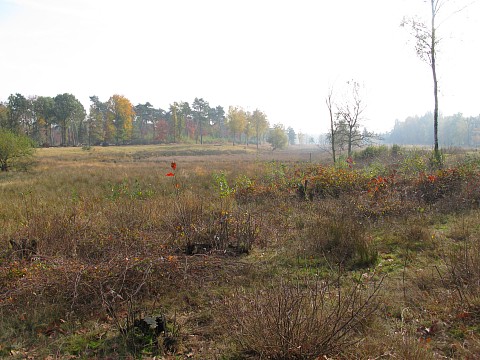
.jpg)
William Blake
(1757-1827)
To Autumn
O Autumn, laden with fruit, and stainèd
With the blood of the grape, pass not, but sit
Beneath my shady roof; there thou may’st rest,
And tune thy jolly voice to my fresh pipe,
And all the daughters of the year shall dance!
Sing now the lusty song of fruits and flowers.
`The narrow bud opens her beauties to
The sun, and love runs in her thrilling veins;
Blossoms hang round the brows of Morning, and
Flourish down the bright cheek of modest Eve,
Till clust’ring Summer breaks forth into singing,
And feather’d clouds strew flowers round her head.
`The spirits of the air live on the smells
Of fruit; and Joy, with pinions light, roves round
The gardens, or sits singing in the trees.’
Thus sang the jolly Autumn as he sat;
Then rose, girded himself, and o’er the bleak
Hills fled from our sight; but left his golden load.
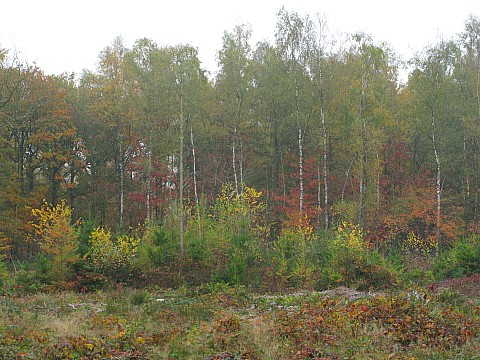


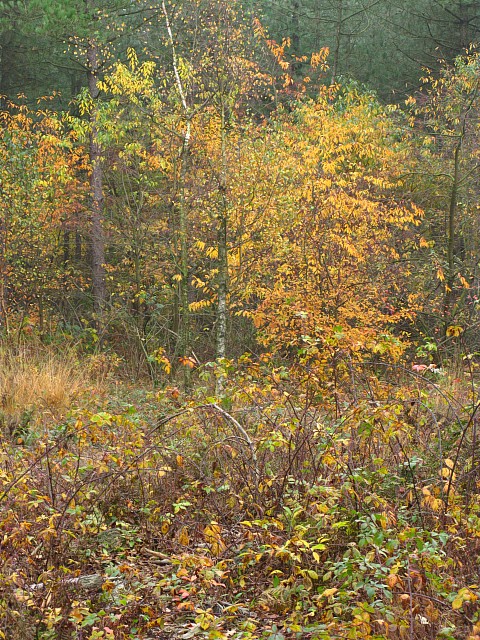

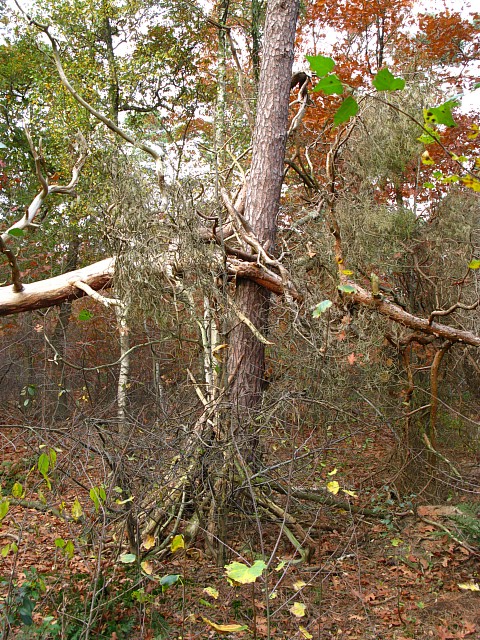
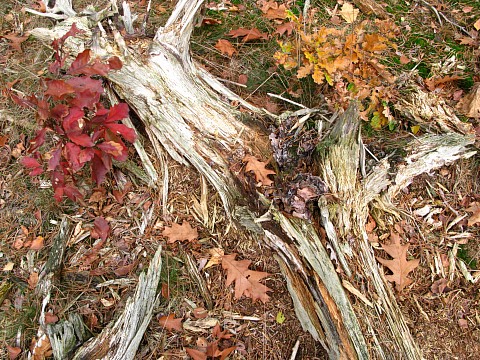
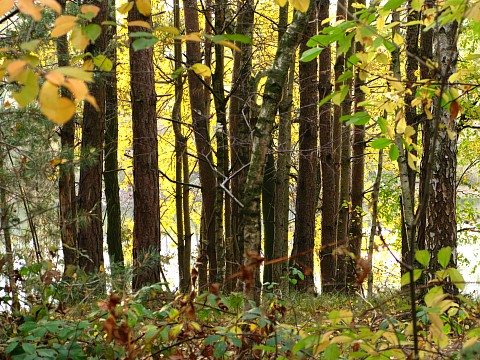
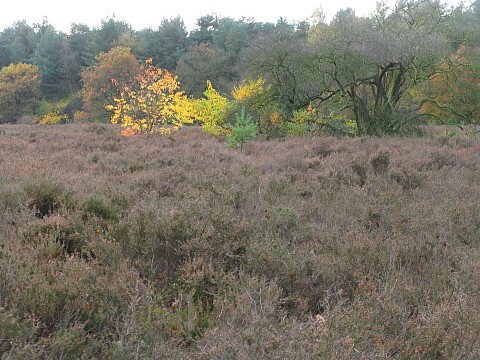

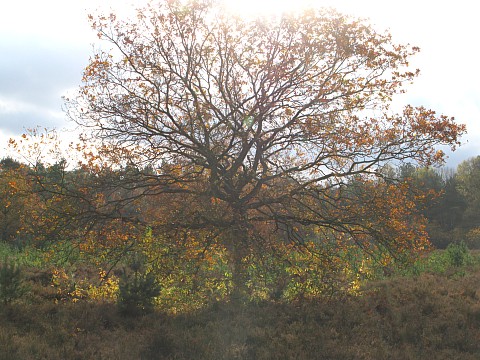
Ton van Kempen photos: Autumn 4
W. Blake poetry
fleursdumal.nl magazine
More in: 4SEASONS#Autumn, Archive A-B, Archive A-B, Blake, William, Ton van Kempen Photos
.jpg)
Joseph Conrad
(1857-1924)
The Lagoon
The white man, leaning with both arms over the roof of the little house
in the stern of the boat, said to the steersman–
“We will pass the night in Arsat’s clearing. It is late.”
The Malay only grunted, and went on looking fixedly at the river. The
white man rested his chin on his crossed arms and gazed at the wake
of the boat. At the end of the straight avenue of forests cut by the
intense glitter of the river, the sun appeared unclouded and dazzling,
poised low over the water that shone smoothly like a band of metal. The
forests, sombre and dull, stood motionless and silent on each side of
the broad stream. At the foot of big, towering trees, trunkless nipa
palms rose from the mud of the bank, in bunches of leaves enormous
and heavy, that hung unstirring over the brown swirl of eddies. In the
stillness of the air every tree, every leaf, every bough, every tendril
of creeper and every petal of minute blossoms seemed to have been
bewitched into an immobility perfect and final. Nothing moved on
the river but the eight paddles that rose flashing regularly, dipped
together with a single splash; while the steersman swept right and left
with a periodic and sudden flourish of his blade describing a glinting
semicircle above his head. The churned-up water frothed alongside with
a confused murmur. And the white man’s canoe, advancing upstream in the
short-lived disturbance of its own making, seemed to enter the portals
of a land from which the very memory of motion had forever departed.
The white man, turning his back upon the setting sun, looked along the
empty and broad expanse of the sea-reach. For the last three miles of
its course the wandering, hesitating river, as if enticed irresistibly
by the freedom of an open horizon, flows straight into the sea, flows
straight to the east–to the east that harbours both light and darkness.
Astern of the boat the repeated call of some bird, a cry discordant and
feeble, skipped along over the smooth water and lost itself, before it
could reach the other shore, in the breathless silence of the world.
The steersman dug his paddle into the stream, and held hard with
stiffened arms, his body thrown forward. The water gurgled aloud; and
suddenly the long straight reach seemed to pivot on its centre, the
forests swung in a semicircle, and the slanting beams of sunset touched
the broadside of the canoe with a fiery glow, throwing the slender and
distorted shadows of its crew upon the streaked glitter of the river.
The white man turned to look ahead. The course of the boat had been
altered at right-angles to the stream, and the carved dragon-head of its
prow was pointing now at a gap in the fringing bushes of the bank. It
glided through, brushing the overhanging twigs, and disappeared from the
river like some slim and amphibious creature leaving the water for its
lair in the forests.
The narrow creek was like a ditch: tortuous, fabulously deep; filled
with gloom under the thin strip of pure and shining blue of the heaven.
Immense trees soared up, invisible behind the festooned draperies of
creepers. Here and there, near the glistening blackness of the water,
a twisted root of some tall tree showed amongst the tracery of small
ferns, black and dull, writhing and motionless, like an arrested snake.
The short words of the paddlers reverberated loudly between the thick
and sombre walls of vegetation. Darkness oozed out from between the
trees, through the tangled maze of the creepers, from behind the
great fantastic and unstirring leaves; the darkness, mysterious and
invincible; the darkness scented and poisonous of impenetrable forests.
The men poled in the shoaling water. The creek broadened, opening out
into a wide sweep of a stagnant lagoon. The forests receded from the
marshy bank, leaving a level strip of bright green, reedy grass to frame
the reflected blueness of the sky. A fleecy pink cloud drifted high
above, trailing the delicate colouring of its image under the floating
leaves and the silvery blossoms of the lotus. A little house, perched
on high piles, appeared black in the distance. Near it, two tall nibong
palms, that seemed to have come out of the forests in the background,
leaned slightly over the ragged roof, with a suggestion of sad
tenderness and care in the droop of their leafy and soaring heads.
The steersman, pointing with his paddle, said, “Arsat is there. I see
his canoe fast between the piles.”
The polers ran along the sides of the boat glancing over their shoulders
at the end of the day’s journey. They would have preferred to spend the
night somewhere else than on this lagoon of weird aspect and ghostly
reputation. Moreover, they disliked Arsat, first as a stranger, and also
because he who repairs a ruined house, and dwells in it, proclaims
that he is not afraid to live amongst the spirits that haunt the places
abandoned by mankind. Such a man can disturb the course of fate by
glances or words; while his familiar ghosts are not easy to propitiate
by casual wayfarers upon whom they long to wreak the malice of their
human master. White men care not for such things, being unbelievers and
in league with the Father of Evil, who leads them unharmed through the
invisible dangers of this world. To the warnings of the righteous they
oppose an offensive pretence of disbelief. What is there to be done?
So they thought, throwing their weight on the end of their long poles.
The big canoe glided on swiftly, noiselessly, and smoothly, towards
Arsat’s clearing, till, in a great rattling of poles thrown down, and
the loud murmurs of “Allah be praised!” it came with a gentle knock
against the crooked piles below the house.
The boatmen with uplifted faces shouted discordantly, “Arsat! O Arsat!”
Nobody came. The white man began to climb the rude ladder giving access
to the bamboo platform before the house. The juragan of the boat said
sulkily, “We will cook in the sampan, and sleep on the water.”
“Pass my blankets and the basket,” said the white man, curtly.
He knelt on the edge of the platform to receive the bundle. Then the
boat shoved off, and the white man, standing up, confronted Arsat,
who had come out through the low door of his hut. He was a man young,
powerful, with broad chest and muscular arms. He had nothing on but
his sarong. His head was bare. His big, soft eyes stared eagerly at
the white man, but his voice and demeanour were composed as he asked,
without any words of greeting–
“Have you medicine, Tuan?”
“No,” said the visitor in a startled tone. “No. Why? Is there sickness
in the house?”
“Enter and see,” replied Arsat, in the same calm manner, and turning
short round, passed again through the small doorway. The white man,
dropping his bundles, followed.
In the dim light of the dwelling he made out on a couch of bamboos a
woman stretched on her back under a broad sheet of red cotton cloth.
She lay still, as if dead; but her big eyes, wide open, glittered in the
gloom, staring upwards at the slender rafters, motionless and unseeing.
She was in a high fever, and evidently unconscious. Her cheeks were sunk
slightly, her lips were partly open, and on the young face there was the
ominous and fixed expression–the absorbed, contemplating expression of
the unconscious who are going to die. The two men stood looking down at
her in silence.
“Has she been long ill?” asked the traveller.
“I have not slept for five nights,” answered the Malay, in a deliberate
tone. “At first she heard voices calling her from the water and
struggled against me who held her. But since the sun of to-day rose she
hears nothing–she hears not me. She sees nothing. She sees not me–me!”
He remained silent for a minute, then asked softly–
“Tuan, will she die?”
“I fear so,” said the white man, sorrowfully. He had known Arsat years
ago, in a far country in times of trouble and danger, when no friendship
is to be despised. And since his Malay friend had come unexpectedly to
dwell in the hut on the lagoon with a strange woman, he had slept many
times there, in his journeys up and down the river. He liked the man who
knew how to keep faith in council and how to fight without fear by the
side of his white friend. He liked him–not so much perhaps as a man
likes his favourite dog–but still he liked him well enough to help and
ask no questions, to think sometimes vaguely and hazily in the midst of
his own pursuits, about the lonely man and the long-haired woman with
audacious face and triumphant eyes, who lived together hidden by the
forests–alone and feared.
The white man came out of the hut in time to see the enormous
conflagration of sunset put out by the swift and stealthy shadows that,
rising like a black and impalpable vapour above the tree-tops, spread
over the heaven, extinguishing the crimson glow of floating clouds and
the red brilliance of departing daylight. In a few moments all the stars
came out above the intense blackness of the earth and the great lagoon
gleaming suddenly with reflected lights resembled an oval patch of night
sky flung down into the hopeless and abysmal night of the wilderness.
The white man had some supper out of the basket, then collecting a
few sticks that lay about the platform, made up a small fire, not
for warmth, but for the sake of the smoke, which would keep off the
mosquitos. He wrapped himself in the blankets and sat with his back
against the reed wall of the house, smoking thoughtfully.
Arsat came through the doorway with noiseless steps and squatted down by
the fire. The white man moved his outstretched legs a little.
“She breathes,” said Arsat in a low voice, anticipating the expected
question. “She breathes and burns as if with a great fire. She speaks
not; she hears not–and burns!”
He paused for a moment, then asked in a quiet, incurious tone–
“Tuan . . . will she die?”
The white man moved his shoulders uneasily and muttered in a hesitating
manner–
“If such is her fate.”
“No, Tuan,” said Arsat, calmly. “If such is my fate. I hear, I see,
I wait. I remember . . . Tuan, do you remember the old days? Do you
remember my brother?”
“Yes,” said the white man. The Malay rose suddenly and went in. The
other, sitting still outside, could hear the voice in the hut. Arsat
said: “Hear me! Speak!” His words were succeeded by a complete silence.
“O Diamelen!” he cried, suddenly. After that cry there was a deep sigh.
Arsat came out and sank down again in his old place.
They sat in silence before the fire. There was no sound within the
house, there was no sound near them; but far away on the lagoon they
could hear the voices of the boatmen ringing fitful and distinct on
the calm water. The fire in the bows of the sampan shone faintly in the
distance with a hazy red glow. Then it died out. The voices ceased.
The land and the water slept invisible, unstirring and mute. It was as
though there had been nothing left in the world but the glitter of stars
streaming, ceaseless and vain, through the black stillness of the night.
The white man gazed straight before him into the darkness with wide-open
eyes. The fear and fascination, the inspiration and the wonder of
death–of death near, unavoidable, and unseen, soothed the unrest of his
race and stirred the most indistinct, the most intimate of his thoughts.
The ever-ready suspicion of evil, the gnawing suspicion that lurks in
our hearts, flowed out into the stillness round him–into the stillness
profound and dumb, and made it appear untrustworthy and infamous, like
the placid and impenetrable mask of an unjustifiable violence. In that
fleeting and powerful disturbance of his being the earth enfolded in
the starlight peace became a shadowy country of inhuman strife, a
battle-field of phantoms terrible and charming, august or ignoble,
struggling ardently for the possession of our helpless hearts. An
unquiet and mysterious country of inextinguishable desires and fears.
A plaintive murmur rose in the night; a murmur saddening and startling,
as if the great solitudes of surrounding woods had tried to whisper
into his ear the wisdom of their immense and lofty indifference. Sounds
hesitating and vague floated in the air round him, shaped themselves
slowly into words; and at last flowed on gently in a murmuring stream
of soft and monotonous sentences. He stirred like a man waking up and
changed his position slightly. Arsat, motionless and shadowy, sitting
with bowed head under the stars, was speaking in a low and dreamy tone–
“. . . for where can we lay down the heaviness of our trouble but in
a friend’s heart? A man must speak of war and of love. You, Tuan, know
what war is, and you have seen me in time of danger seek death as other
men seek life! A writing may be lost; a lie may be written; but what the
eye has seen is truth and remains in the mind!”
“I remember,” said the white man, quietly. Arsat went on with mournful
composure–
“Therefore I shall speak to you of love. Speak in the night. Speak
before both night and love are gone–and the eye of day looks upon my
sorrow and my shame; upon my blackened face; upon my burnt-up heart.”
A sigh, short and faint, marked an almost imperceptible pause, and then
his words flowed on, without a stir, without a gesture.
“After the time of trouble and war was over and you went away from my
country in the pursuit of your desires, which we, men of the islands,
cannot understand, I and my brother became again, as we had been
before, the sword-bearers of the Ruler. You know we were men of family,
belonging to a ruling race, and more fit than any to carry on our right
shoulder the emblem of power. And in the time of prosperity Si Dendring
showed us favour, as we, in time of sorrow, had showed to him the
faithfulness of our courage. It was a time of peace. A time of
deer-hunts and cock-fights; of idle talks and foolish squabbles between
men whose bellies are full and weapons are rusty. But the sower watched
the young rice-shoots grow up without fear, and the traders came and
went, departed lean and returned fat into the river of peace. They
brought news, too. Brought lies and truth mixed together, so that no man
knew when to rejoice and when to be sorry. We heard from them about you
also. They had seen you here and had seen you there. And I was glad to
hear, for I remembered the stirring times, and I always remembered you,
Tuan, till the time came when my eyes could see nothing in the past,
because they had looked upon the one who is dying there–in the house.”
He stopped to exclaim in an intense whisper, “O Mara bahia! O Calamity!”
then went on speaking a little louder:
“There’s no worse enemy and no better friend than a brother, Tuan, for
one brother knows another, and in perfect knowledge is strength for good
or evil. I loved my brother. I went to him and told him that I could see
nothing but one face, hear nothing but one voice. He told me: ‘Open your
heart so that she can see what is in it–and wait. Patience is wisdom.
Inchi Midah may die or our Ruler may throw off his fear of a woman!’
. . . I waited! . . . You remember the lady with the veiled face, Tuan, and
the fear of our Ruler before her cunning and temper. And if she wanted
her servant, what could I do? But I fed the hunger of my heart on short
glances and stealthy words. I loitered on the path to the bath-houses in
the daytime, and when the sun had fallen behind the forest I crept along
the jasmine hedges of the women’s courtyard. Unseeing, we spoke to
one another through the scent of flowers, through the veil of leaves,
through the blades of long grass that stood still before our lips; so
great was our prudence, so faint was the murmur of our great longing.
The time passed swiftly . . . and there were whispers amongst women–and
our enemies watched–my brother was gloomy, and I began to think of
killing and of a fierce death. . . . We are of a people who take what
they want–like you whites. There is a time when a man should forget
loyalty and respect. Might and authority are given to rulers, but to all
men is given love and strength and courage. My brother said, ‘You shall
take her from their midst. We are two who are like one.’ And I answered,
‘Let it be soon, for I find no warmth in sunlight that does not shine
upon her.’ Our time came when the Ruler and all the great people went
to the mouth of the river to fish by torchlight. There were hundreds
of boats, and on the white sand, between the water and the forests,
dwellings of leaves were built for the households of the Rajahs. The
smoke of cooking-fires was like a blue mist of the evening, and many
voices rang in it joyfully. While they were making the boats ready to
beat up the fish, my brother came to me and said, ‘To-night!’ I looked
to my weapons, and when the time came our canoe took its place in the
circle of boats carrying the torches. The lights blazed on the water,
but behind the boats there was darkness. When the shouting began and the
excitement made them like mad we dropped out. The water swallowed our
fire, and we floated back to the shore that was dark with only here
and there the glimmer of embers. We could hear the talk of slave-girls
amongst the sheds. Then we found a place deserted and silent. We waited
there. She came. She came running along the shore, rapid and leaving
no trace, like a leaf driven by the wind into the sea. My brother said
gloomily, ‘Go and take her; carry her into our boat.’ I lifted her in
my arms. She panted. Her heart was beating against my breast. I said, ‘I
take you from those people. You came to the cry of my heart, but my arms
take you into my boat against the will of the great!’ ‘It is right,’
said my brother. ‘We are men who take what we want and can hold it
against many. We should have taken her in daylight.’ I said, ‘Let us be
off’; for since she was in my boat I began to think of our Ruler’s many
men. ‘Yes. Let us be off,’ said my brother. ‘We are cast out and this
boat is our country now–and the sea is our refuge.’ He lingered with
his foot on the shore, and I entreated him to hasten, for I remembered
the strokes of her heart against my breast and thought that two men
cannot withstand a hundred. We left, paddling downstream close to the
bank; and as we passed by the creek where they were fishing, the great
shouting had ceased, but the murmur of voices was loud like the humming
of insects flying at noonday. The boats floated, clustered together, in
the red light of torches, under a black roof of smoke; and men talked of
their sport. Men that boasted, and praised, and jeered–men that would
have been our friends in the morning, but on that night were already our
enemies. We paddled swiftly past. We had no more friends in the country
of our birth. She sat in the middle of the canoe with covered face;
silent as she is now; unseeing as she is now–and I had no regret at
what I was leaving because I could hear her breathing close to me–as I
can hear her now.”
He paused, listened with his ear turned to the doorway, then shook his
head and went on:
“My brother wanted to shout the cry of challenge–one cry only–to let
the people know we were freeborn robbers who trusted our arms and the
great sea. And again I begged him in the name of our love to be silent.
Could I not hear her breathing close to me? I knew the pursuit would
come quick enough. My brother loved me. He dipped his paddle without a
splash. He only said, ‘There is half a man in you now–the other half is
in that woman. I can wait. When you are a whole man again, you will come
back with me here to shout defiance. We are sons of the same mother.’ I
made no answer. All my strength and all my spirit were in my hands that
held the paddle–for I longed to be with her in a safe place beyond the
reach of men’s anger and of women’s spite. My love was so great, that
I thought it could guide me to a country where death was unknown, if I
could only escape from Inchi Midah’s fury and from our Ruler’s sword.
We paddled with haste, breathing through our teeth. The blades bit deep
into the smooth water. We passed out of the river; we flew in clear
channels amongst the shallows. We skirted the black coast; we skirted
the sand beaches where the sea speaks in whispers to the land; and the
gleam of white sand flashed back past our boat, so swiftly she ran upon
the water. We spoke not. Only once I said, ‘Sleep, Diamelen, for soon
you may want all your strength.’ I heard the sweetness of her voice, but
I never turned my head. The sun rose and still we went on. Water fell
from my face like rain from a cloud. We flew in the light and heat. I
never looked back, but I knew that my brother’s eyes, behind me, were
looking steadily ahead, for the boat went as straight as a bushman’s
dart, when it leaves the end of the sumpitan. There was no better
paddler, no better steersman than my brother. Many times, together, we
had won races in that canoe. But we never had put out our strength as we
did then–then, when for the last time we paddled together! There was no
braver or stronger man in our country than my brother. I could not spare
the strength to turn my head and look at him, but every moment I heard
the hiss of his breath getting louder behind me. Still he did not speak.
The sun was high. The heat clung to my back like a flame of fire. My
ribs were ready to burst, but I could no longer get enough air into
my chest. And then I felt I must cry out with my last breath, ‘Let us
rest!’ . . . ‘Good!’ he answered; and his voice was firm. He was strong.
He was brave. He knew not fear and no fatigue . . . My brother!”
A murmur powerful and gentle, a murmur vast and faint; the murmur of
trembling leaves, of stirring boughs, ran through the tangled depths of
the forests, ran over the starry smoothness of the lagoon, and the water
between the piles lapped the slimy timber once with a sudden splash.
A breath of warm air touched the two men’s faces and passed on with
a mournful sound–a breath loud and short like an uneasy sigh of the
dreaming earth.
Arsat went on in an even, low voice.
“We ran our canoe on the white beach of a little bay close to a long
tongue of land that seemed to bar our road; a long wooded cape going far
into the sea. My brother knew that place. Beyond the cape a river has
its entrance, and through the jungle of that land there is a narrow
path. We made a fire and cooked rice. Then we lay down to sleep on the
soft sand in the shade of our canoe, while she watched. No sooner had I
closed my eyes than I heard her cry of alarm. We leaped up. The sun was
halfway down the sky already, and coming in sight in the opening of the
bay we saw a prau manned by many paddlers. We knew it at once; it was
one of our Rajah’s praus. They were watching the shore, and saw us. They
beat the gong, and turned the head of the prau into the bay. I felt my
heart become weak within my breast. Diamelen sat on the sand and covered
her face. There was no escape by sea. My brother laughed. He had the
gun you had given him, Tuan, before you went away, but there was only a
handful of powder. He spoke to me quickly: ‘Run with her along the path.
I shall keep them back, for they have no firearms, and landing in the
face of a man with a gun is certain death for some. Run with her. On the
other side of that wood there is a fisherman’s house–and a canoe.
When I have fired all the shots I will follow. I am a great runner, and
before they can come up we shall be gone. I will hold out as long as I
can, for she is but a woman–that can neither run nor fight, but she has
your heart in her weak hands.’ He dropped behind the canoe. The prau was
coming. She and I ran, and as we rushed along the path I heard shots.
My brother fired–once–twice–and the booming of the gong ceased. There
was silence behind us. That neck of land is narrow. Before I heard my
brother fire the third shot I saw the shelving shore, and I saw the
water again; the mouth of a broad river. We crossed a grassy glade. We
ran down to the water. I saw a low hut above the black mud, and a small
canoe hauled up. I heard another shot behind me. I thought, ‘That is his
last charge.’ We rushed down to the canoe; a man came running from the
hut, but I leaped on him, and we rolled together in the mud. Then I got
up, and he lay still at my feet. I don’t know whether I had killed him
or not. I and Diamelen pushed the canoe afloat. I heard yells behind me,
and I saw my brother run across the glade. Many men were bounding after
him, I took her in my arms and threw her into the boat, then leaped in
myself. When I looked back I saw that my brother had fallen. He fell
and was up again, but the men were closing round him. He shouted, ‘I am
coming!’ The men were close to him. I looked. Many men. Then I looked
at her. Tuan, I pushed the canoe! I pushed it into deep water. She was
kneeling forward looking at me, and I said, ‘Take your paddle,’ while
I struck the water with mine. Tuan, I heard him cry. I heard him cry my
name twice; and I heard voices shouting, ‘Kill! Strike!’ I never turned
back. I heard him calling my name again with a great shriek, as when
life is going out together with the voice–and I never turned my head.
My own name! . . . My brother! Three times he called–but I was not
afraid of life. Was she not there in that canoe? And could I not with
her find a country where death is forgotten–where death is unknown!”
The white man sat up. Arsat rose and stood, an indistinct and silent
figure above the dying embers of the fire. Over the lagoon a mist
drifting and low had crept, erasing slowly the glittering images of
the stars. And now a great expanse of white vapour covered the land: it
flowed cold and gray in the darkness, eddied in noiseless whirls round
the tree-trunks and about the platform of the house, which seemed to
float upon a restless and impalpable illusion of a sea. Only far away
the tops of the trees stood outlined on the twinkle of heaven, like a
sombre and forbidding shore–a coast deceptive, pitiless and black.
Arsat’s voice vibrated loudly in the profound peace.
“I had her there! I had her! To get her I would have faced all mankind.
But I had her–and–”
His words went out ringing into the empty distances. He paused, and
seemed to listen to them dying away very far–beyond help and beyond
recall. Then he said quietly–
“Tuan, I loved my brother.”
A breath of wind made him shiver. High above his head, high above the
silent sea of mist the drooping leaves of the palms rattled together
with a mournful and expiring sound. The white man stretched his legs.
His chin rested on his chest, and he murmured sadly without lifting his
head–
“We all love our brothers.”
Arsat burst out with an intense whispering violence–
“What did I care who died? I wanted peace in my own heart.”
He seemed to hear a stir in the house–listened–then stepped in
noiselessly. The white man stood up. A breeze was coming in fitful
puffs. The stars shone paler as if they had retreated into the frozen
depths of immense space. After a chill gust of wind there were a few
seconds of perfect calm and absolute silence. Then from behind the black
and wavy line of the forests a column of golden light shot up into the
heavens and spread over the semicircle of the eastern horizon. The sun
had risen. The mist lifted, broke into drifting patches, vanished into
thin flying wreaths; and the unveiled lagoon lay, polished and black, in
the heavy shadows at the foot of the wall of trees. A white eagle rose
over it with a slanting and ponderous flight, reached the clear sunshine
and appeared dazzlingly brilliant for a moment, then soaring higher,
became a dark and motionless speck before it vanished into the blue as
if it had left the earth forever. The white man, standing gazing upwards
before the doorway, heard in the hut a confused and broken murmur of
distracted words ending with a loud groan. Suddenly Arsat stumbled out
with outstretched hands, shivered, and stood still for some time with
fixed eyes. Then he said–
“She burns no more.”
Before his face the sun showed its edge above the tree-tops rising
steadily. The breeze freshened; a great brilliance burst upon the
lagoon, sparkled on the rippling water. The forests came out of the
clear shadows of the morning, became distinct, as if they had rushed
nearer–to stop short in a great stir of leaves, of nodding boughs, of
swaying branches. In the merciless sunshine the whisper of unconscious
life grew louder, speaking in an incomprehensible voice round the dumb
darkness of that human sorrow. Arsat’s eyes wandered slowly, then stared
at the rising sun.
“I can see nothing,” he said half aloud to himself.
“There is nothing,” said the white man, moving to the edge of the
platform and waving his hand to his boat. A shout came faintly over the
lagoon and the sampan began to glide towards the abode of the friend of
ghosts.
“If you want to come with me, I will wait all the morning,” said the
white man, looking away upon the water.
“No, Tuan,” said Arsat, softly. “I shall not eat or sleep in this house,
but I must first see my road. Now I can see nothing–see nothing! There
is no light and no peace in the world; but there is death–death for
many. We are sons of the same mother–and I left him in the midst of
enemies; but I am going back now.”
He drew a long breath and went on in a dreamy tone:
“In a little while I shall see clear enough to strike–to strike. But
she has died, and . . . now . . . darkness.”
He flung his arms wide open, let them fall along his body, then stood
still with unmoved face and stony eyes, staring at the sun. The white
man got down into his canoe. The polers ran smartly along the sides
of the boat, looking over their shoulders at the beginning of a weary
journey. High in the stern, his head muffled up in white rags, the
juragan sat moody, letting his paddle trail in the water. The white man,
leaning with both arms over the grass roof of the little cabin, looked
back at the shining ripple of the boat’s wake. Before the sampan passed
out of the lagoon into the creek he lifted his eyes. Arsat had not
moved. He stood lonely in the searching sunshine; and he looked beyond
the great light of a cloudless day into the darkness of a world of
illusions.
.jpg)
Joseph Conrad: The Lagoon
fleursdumal.nl magazine
![]()
More in: Archive C-D, Conrad, Joseph, Joseph Conrad
.jpg)
Joris-Karl Huysmans
(1849-1907)
Le Drageoir aux épices (1874)
VI. La Kermesse de Rubens
Le lendemain soir, j’errais dans les rues d’un petit village situé en Picardie, au bord de la mer. Le vent soufflait avec rage, les vagues croulaient les unes sur les autres, et les moulins à vent découpaient leurs silhouettes grêles sur de monstrueux amas de nuages noirs. çà et là, sur la route, étincelaient de petites chapelles, élevées par les marins à la Vierge protectrice. Je marchais lentement, baisant tes lèvres rudes, aspirant l’âcre et chaude senteur de ta bouche, ô ma vieille maîtresse, ma vieille Gambier! j’écoutais le grincement des meules et le renâclement farouche de la mer, quand soudain retentit à mon oreille un air de danse, et j’aperçus une faible lueur qui rougeoyait à la fenêtre d’une grange. C’était le bal des pêcheurs et des matelotes. Quelle différence avec celui que j’avais vu hier au soir! Au lieu de cette truandaille ramassée dans je ne sais quel ruisseau, j’avais devant les yeux des gars à la figure honnête et douce; au lieu de ces visages dépenaillés et rongés par les onguents, de ces yeux ardoisés et séchés par la débauche, de ces lèvres minces et orlées de carmin, je voyais de bonnes grosses figures rouges, des yeux vifs et gais, des lèvres épaisses et gonflées de sang; je voyais s’épanouir, au lieu de chairs flétries, des chairs énormes, comme les peignait Rubens, des joues roses et dures, comme les aimait Jordaens.
Au fond de la salle, se tenait un vieillard de quatre-vingts ans, tout rapetissé et ratatiné; sa figure était sillonnée de ravines et de sentes qui s’enlaçaient et formaient un capricieux treillis; ses petits yeux noirs, plissés, bridés jusqu’aux tempes, étaient couverts d’une taie blanche comme des boules d’agate marbrées de blanc, et son gros nez saillant étrangement, diapré de bubelettes nacarat, boutonné d’améthystes troubles.
C’était le doyen des pêcheurs, l’oracle du village. Dans le coin, à sa gauche, quatre loups de mer s’étaient attablés. Deux jouaient aux cartes et les deux autres les regardaient jouer. Ils avaient tous le teint hâlé et brun comme le vieux chêne, des chevelures emmêlées et grisonnantes, des mines truculentes et bonnes. Ils vidaient, à petites gorgées, leur tasse de café, et s’essuyaient les lèvres du revers de leur manche. La partie était intéressante, le coup était difficile; celui qui devait jouer tenait son menton dans sa grosse main couleur de cannelle et regardait son jeu avec inquiétude. Il touchait une carte, puis une autre, sans pouvoir se décider a choisir entre elles; son partner l’observait en riant et d’un air vainqueur, et les deux autres tiraient d’épaisses bouffées de leur pipe et se poussaient le coude en clignant de l’oeil. On eut dit un tableau de Teniers, il n’y manquait vraiment que les deux arbres et le château des Trois-Tours.
Pendant ce temps, le cornet et le violon faisaient rage, et de grands gaillards, membrus et souples, les oreilles ornées de petites poires d’or, gambadaient comme des singes et faisaient tournoyer les grosses pêcheuses, qui s’esclaffaient de rire comme des folles. La plupart étaient laides, et pourtant elles étaient charmantes avec leurs petits bonnets blancs, jaspés de fleurs violettes, leur grosse camisole et leurs manches en tricot rouge et jaune. Les enfants et les chiens se mirent bientôt de ]a partie et se roulèrent sur le plancher. Ce n’était plus une danse villageoise de Teniers, c’était la kermesse de Rubens, mais une kermesse pudique, car les mamans tricotaient sur les bancs et surveillaient, du coin de l’oeil, leurs garçons et leurs filles.
Eh bien! je vous jure que cette joie était bonne à voir, je vous jure que la naïve simplesse de ces grosses matelotes m’a ravi et que j’ai détesté plus encore ces bauges de Paris où s’agitent comme cinglés par le fouet de l’hystérie, un ramassis de naïades d’égout et de sinistres riboteurs!
kempis poetry magazine
More in: -Le Drageoir aux épices, Huysmans, J.-K.

Jan Gielkens
Handgeschreven
Hoe bijzonder is een handgeschreven gedicht
van de minor poet Freek van Leeuwen?
In 1984 ruimde ik de bibliotheek op van de in dat jaar overleden Scandinaviste en vertaalster Saskia Ferwerda. Ze had een huis vol boeken, de helft ervan had betrekking op haar specialisme. Deze Scandinavische bibliotheek werd door de familie geschonken aan de universiteitsbibliotheek in Utrecht, maar die zat met de boeken in haar maag. De boeken belandden in de kelder van een pand aan het Lucas Bolwerk en bleven daar totdat dat pand een andere bestemming kreeg en leeg moest.
Niemand bleek zich voor de boeken verantwoordelijk te voelen en ze belandden in een container, waar ze in brand werden gestoken. De rest van de boeken had een beter lot: ze werden verkocht om er een Scandinavisch boekenreeksje van te financieren, en dat gebeurde tot het geld op was. Uit de niet-Scandinavische bibliotheek schonk ik later een aantal boeken met opdracht aan het Letterkundig Museum, zoals een bundel van Benno Barnard, die in Utrecht de buurjongen van Saskia Ferwerda was geweest. Gesigneerde bundels, brieven en Sinterklaasgedichten van de nu vergeten christelijke dichteres Tony de Ridder zaten er ook bij, net als een briefkaartje van Nobelprijswinnares Selma Lagerlöf, bij wie Saskia Ferwerda in Zweden op bezoek was geweest.
Een van de gesigneerde bundels was van de minor poet Freek van Leeuwen (1905-1968), die via de sociaaldemocratie bij het schrijverscollectief Links Richten terecht was gekomen en die later naar zijn christelijke roots zou terugkeren. Bij Van Leeuwens vijftigste verjaardag in februari 1955 verscheen bij De Beuk in Amsterdam de poëziebundel Rood en wit, een bloemlezing uit oud en nieuw werk onder redactie van Wim J. Simons. Op het schutblad van het exemplaar van Saskia Ferwerda stond een handgeschreven gedicht:

In 2002 vond ik bij De Slegte in Den Haag nog een exemplaar van Rood en wit, en op het schutblad stond een handgeschreven gedicht van de auteur. Het was hetzelfde gedicht als in de bundel van Saskia Ferwerda, zo herinnerde ik me, dus ik dacht: het LM heeft mijn cadeau verpatst. Ik dus een misschien wat al te boos briefje naar het LM gestuurd, waarop toenmalig directeur Anton Korteweg netjes en per omgaande antwoordde met de mededeling dat het boek dat ik indertijd had geschonken gewoon in de collectie van het museum zat. Een meegestuurde fotokopie bewees dat. Maar die kopie bewees ook dat mijn gedachte helemaal niet zo vreemd was:
.jpg)
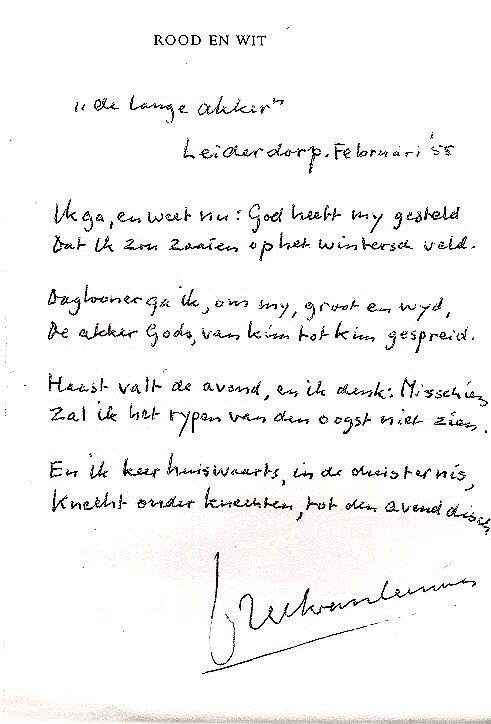
En nu, nu ik over deze curieuze zaak wil schrijven, kijk ik eens wat rond op internet en vind er nog een: bij antiquariaat Fokas Holthuis in Den Haag:
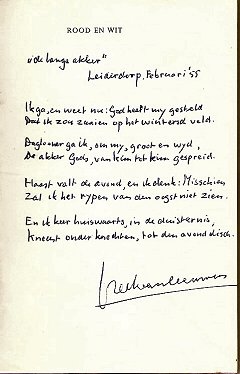
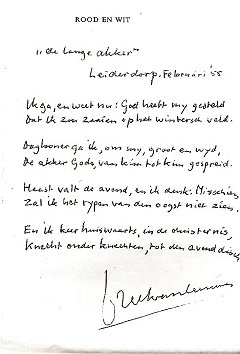

Hoeveel van dit soort exemplaren zou Freek van Leeuwen hebben zitten pennen met zijn ballpoint?
Jan Gielkens over bibliofiele vondsten en typografische bijzonderheden
Eerder gepubliceerd op:www.teksteditie.org
kempis poetry magazine
More in: - Book Stories, Archive K-L, Jan Gielkens
.jpg)
Giacomo Leopardi
(1798-1837)
All’Italia
O patria mia, vedo le mura e gli archi
E le colonne e i simulacri e l’erme
Torri degli avi nostri,
Ma la gloria non vedo,
Non vedo il lauro e il ferro ond’eran carchi
I nostri padri antichi. Or fatta inerme,
Nuda la fronte e nudo il petto mostri.
Oimè quante ferite,
Che lividor, che sangue! oh qual ti veggio,
Formosissima donna! Io chiedo al cielo
E al mondo: dite dite;
Chi la ridusse a tale? E questo è peggio,
Che di catene ha carche ambe le braccia;
Sì che sparte le chiome e senza velo
Siede in terra negletta e sconsolata,
Nascondendo la faccia
Tra le ginocchia, e piange.
Piangi, che ben hai donde, Italia mia,
Le genti a vincer nata
E nella fausta sorte e nella ria.
Se fosser gli occhi tuoi due fonti vive,
Mai non potrebbe il pianto
Adeguarsi al tuo danno ed allo scorno;
Che fosti donna, or sei povera ancella.
Chi di te parla o scrive,
Che, rimembrando il tuo passato vanto,
Non dica: già fu grande, or non è quella?
Perchè, perchè? dov’è la forza antica,
Dove l’armi e il valore e la costanza?
Chi ti discinse il brando?
Chi ti tradì? qual arte o qual fatica
O qual tanta possanza
Valse a spogliarti il manto e l’auree bende?
Come cadesti o quando
Da tanta altezza in così basso loco?
Nessun pugna per te? non ti difende
Nessun de’ tuoi? L’armi, qua l’armi: io solo
Combatterò, procomberò sol io.
Dammi, o ciel, che sia foco
Agl’italici petti il sangue mio.
Dove sono i tuoi figli? Odo suon d’armi
E di carri e di voci e di timballi:
In estranie contrade
Pugnano i tuoi figliuoli.
Attendi, Italia, attendi. Io veggio, o parmi,
Un fluttuar di fanti e di cavalli,
E fumo e polve, e luccicar di spade
Come tra nebbia lampi.
Nè ti conforti? e i tremebondi lumi
Piegar non soffri al dubitoso evento?
A che pugna in quei campi
L’itala gioventude? O numi, o numi:
Pugnan per altra terra itali acciari.
Oh misero colui che in guerra è spento,
Non per li patrii lidi e per la pia
Consorte e i figli cari,
Ma da nemici altrui
Per altra gente, e non può dir morendo:
Alma terra natia,
La vita che mi desti ecco ti rendo.
Oh venturose e care e benedette
L’antiche età, che a morte
Per la patria correan le genti a squadre;
E voi sempre onorate e gloriose,
O tessaliche strette,
Dove la Persia e il fato assai men forte
Fu di poch’alme franche e generose!
Io credo che le piante e i sassi e l’onda
E le montagne vostre al passeggere
Con indistinta voce
Narrin siccome tutta quella sponda
Coprìr le invitte schiere
De’ corpi ch’alla Grecia eran devoti.
Allor, vile e feroce,
Serse per l’Ellesponto si fuggia,
Fatto ludibrio agli ultimi nepoti;
E sul colle d’Antela, ove morendo
Si sottrasse da morte il santo stuolo,
Simonide salia,
Guardando l’etra e la marina e il suolo.
E di lacrime sparso ambe le guance,
E il petto ansante, e vacillante il piede,
Toglieasi in man la lira:
Beatissimi voi,
Ch’offriste il petto alle nemiche lance
Per amor di costei ch’al Sol vi diede;
Voi che la Grecia cole, e il mondo ammira.
Nell’armi e ne’ perigli
Qual tanto amor le giovanette menti,
Qual nell’acerbo fato amor vi trasse?
Come sì lieta, o figli,
L’ora estrema vi parve, onde ridenti
Correste al passo lacrimoso e duro?
Parea ch’a danza e non a morte andasse
Ciascun de’ vostri, o a splendido convito:
Ma v’attendea lo scuro
Tartaro, e l’onda morta;
Nè le spose vi foro o i figli accanto
Quando su l’aspro lito
Senza baci moriste e senza pianto.
Ma non senza de’ Persi orrida pena
Ed immortale angoscia.
Come lion di tori entro una mandra
Or salta a quello in tergo e sì gli scava
Con le zanne la schiena,
Or questo fianco addenta or quella coscia;
Tal fra le Perse torme infuriava
L’ira de’ greci petti e la virtute.
Ve’ cavalli supini e cavalieri;
Vedi intralciare ai vinti
La fuga i carri e le tende cadute,
E correr fra’ primieri
Pallido e scapigliato esso tiranno;
Ve’ come infusi e tinti
Del barbarico sangue i greci eroi,
Cagione ai Persi d’infinito affanno,
A poco a poco vinti dalle piaghe,
L’un sopra l’altro cade. Oh viva, oh viva:
Beatissimi voi
Mentre nel mondo si favelli o scriva.
Prima divelte, in mar precipitando,
Spente nell’imo strideran le stelle,
Che la memoria e il vostro
Amor trascorra o scemi.
La vostra tomba è un’ara; e qua mostrando
Verran le madri ai parvoli le belle
Orme del vostro sangue. Ecco io mi prostro,
O benedetti, al suolo,
E bacio questi sassi e queste zolle,
Che fien lodate e chiare eternamente
Dall’uno all’altro polo.
Deh foss’io pur con voi qui sotto, e molle
Fosse del sangue mio quest’alma terra.
Che se il fato è diverso, e non consente
Ch’io per la Grecia i moribondi lumi
Chiuda prostrato in guerra,
Così la vereconda
Fama del vostro vate appo i futuri
Possa, volendo i numi,
Tanto durar quanto la vostra duri.
(1818)
![]()
Giacomo Leopardi poetry
fleursdumal.nl magazine
![]()
More in: Leopardi, Giacomo
.jpg)
C h a r l e s C r o s
(1842-1888)
Ballade des mauvaises personnes
Qu’on vive dans les étincelles
Ou qu’on dorme sur le gazon
Au bruit des râteaux et des pelles,
On entend mâles et femelles
Prêtes à toute trahison,
Les personnes perpétuelles
Aiguisant leurs griffes cruelles,
Les personnes qui ont raison.
Elles rêvent (choses nouvelles !)
Le pistolet et le poison.
Elles ont des chants de crécelles
Elles n’ont rien dans leurs cervelles
Ni dans le coeur aucun tison,
Froissant les fleurs sous leurs semelles
Et courant des routes (lesquelles ?)
Les personnes qui ont raison.
Malgré tant d’injures mortelles
Les roses poussent à foison
Et les seins gonflent les dentelles
Et rose est encor l’horizon ;
Roses sont Marie et Suzon !
Mais, les autres, que veulent-elles ?
Elles ne sont vraiment pas belles,
Les personnes qui ont raison.
ENVOI
Prince, qui, gracieux, excelles
A nous tirer de la prison,
Chasse au loin par tes ritournelles
Les personnes qui ont raison.
.jpg)
Charles Cros poetry
kempis poetry magazine
![]()
More in: Cros, Charles
Thank you for reading Fleurs du Mal - magazine for art & literature